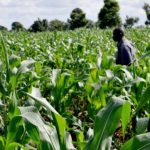About 250,000 smallholder farmers across eight Nigerian states have been insured under a risk-mitigation initiative coordinated by the Presidential Food Systems Coordination Unit (PFSCU) between April and October 2025.
The insurance, which covers the 2025 wet-season farming cycle, extends to farmers in Borno, Ekiti, Enugu, Kaduna, Jigawa, Niger, Plateau, and Taraba states. According to documents from the PFSCU, the policy was designed to protect farmers from climate shocks and market volatility that continue to threaten the country’s food system and small agribusinesses.
Created in 2024 under the National Economic Council (NEC), the PFSCU was established to coordinate food-system interventions across federal, state, and local governments. Led by the Technical Assistant to the President on Agriculture, Marion Moon, the unit is implementing the National Agribusiness Policy Mechanism (NAPM) while supervising state-level food programmes nationwide.
Vice President Kashim Shettima had earlier described NAPM as a “data-driven, state-led model” for synchronising agricultural activities across Nigeria using real-time analytics.
According to PFSCU records, verification and farmer-extension workshops for the insurance scheme began in April 2025 across the pilot states, with plans for additional coverage in Cross River, Edo, Ebonyi, Kebbi, and Oyo states that are yet to receive NAPM inputs.
The policy provides protection against crop failure and ensures access to quality inputs for farmers affected by flooding, drought, or price instability. The scheme will continue through the 2026 dry-season farming cycle before expanding nationwide.
The initiative comes at a critical time, as the National Bureau of Statistics and the Food and Agriculture Organisation (FAO) have warned that climate-related losses could worsen Nigeria’s food crisis. Although food inflation slightly dropped to 16.87 per cent in September 2025, more than 30 million Nigerians still faced acute food insecurity during the lean season.
PFSCU noted that the insurance scheme complements other flagship projects such as the Harvesting Hope Caravan, the 30-Per-Cent Value-Addition Bill, and the €995 million Nigeria–Brazil Green Imperative Project. The unit also plans to integrate the scheme’s database into NEC’s live food-balance dashboard by 2026 to strengthen agricultural monitoring.
Despite the progress, Moon disclosed that only three states, Ekiti, Cross River, and Jigawa, have fully committed to the programme. “What we found is that the states represented on the steering committee have moved faster because they understand our daily operations and the value of engagement,” she explained.
Moon added that stronger collaboration between federal and state governments is crucial to achieving Nigeria’s long-term food-security goals.










